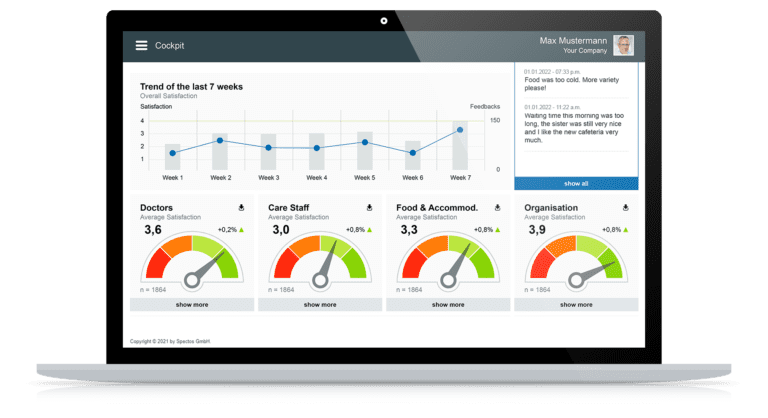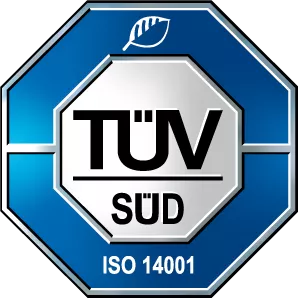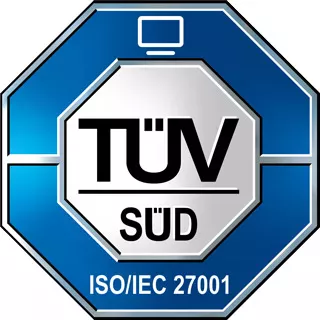German Hospitals Operate in the Red
The Hospital Rating Report 2019 by Deloitte shows that the economic situation of German hospitals continues to deteriorate. 13% of the institutions were in the “red zone”, which means an increased risk of insolvency due to a decreasing number of patients and a consequently falling income.

However, the effects of the corona pandemic were not yet taken into account: cancelled or postponed operations and beds kept free for Covid-19 patients lead to further losses for clinics. In addition, resources such as surgical masks had to be allocated quickly and efficiently between different locations.
But how can these developments come to a halt? Can digital solutions help at this point and improve the economic situation of hospitals?
“Digitalization” Has Become a Taboo Word – What Does This Actually Mean?
Digitalization is a major challenge for many companies and institutions. Processes are changed, employees are disrupted in their daily tasks and sometimes delays as well as complications occur at the implementation of digital solutions. In some industries these problems are easy to overcome, but in the healthcare industry digitalization is progressing noticeably more slowly.
Even the Hospital Future Act of 2020, which offers hospitals financial support in the implementation of their digitalization projects, shows only limited effects. The industry is very complex, the expenditure for IT security and data protection is very high and especially older patients struggle dealing with digital media.
Nevertheless, the healthcare industry in particular can greatly profit from digital solutions, for instance through
So what are applicable starting points for digitalization in healthcare?
First Steps towards Digitalization in Healthcare

The data obtained from digital surveys are accessible at any time in via cockpits, whereby problems can be spotted in an early stage.
Digital satisfaction surveys of patients, healthcare staff and referring doctors are a good way to get started with digitalization in healthcare. Surveys can be conducted online via multiple communication channels, for example via smartphones, tablets or QR codes. The obtained data is stored and made available in a central platform. It can be accessed at any time via cockpits, allowing problems to be identified early stage and targeted measures to be taken. Regularly conducted, this approach makes an important contribution to the continuous improvement of the institution’s economic situation.
The surveys can be expanded successively by solutions for complaint-, audit– and inventory management, cirs etc. Regular inspections are quite challenging, especially in larger medical facilities, but are indispensable to ensure good quality. Digital solutions simplify the planning, coordination and evaluation of audits. Institutions can improve their image and receive certifications through the continuous digitalized quality control. Thanks to digital media the process of taking stock becomes less time-intensive, which allows immediate and more efficient responses to urgent issues.
Additionally, the digital surveys and audits enable healthcare institutions to identify potential and make use of it for further digitalization measures.
Current Attitudes Regarding Digitalization in the German Healthcare Industry
Germany is still far behind when it comes to digitalization in healthcare. While online consultation hours via video chat with the doctor are already well established in Switzerland and Great Britain, telecommunication in the German healthcare system is still in the early introductory stage.
This development goes along with the perceptions of involved players in the healthcare industry. The QM Monitor Health Care 4.0 – a research study by Spectos GmbH in cooperation with M+M Consulting – is aimed at quality management officers from clinics and medical facilities in the DACH region. The goal of the study is to capture current attitudes towards digitalization and the use of digital solutions for quality management.
In this study, more than half of the participants (completely) agreed that

In addition, digitalization represents an important framework for today’s management decisions, with around every second study participant being partially satisfied, dissatisfied or very dissatisfied with the current status of quality management in their medical institution. Although digitalization is becoming increasingly important, paper-based surveys are still dominating.
Nevertheless: According to a Bitkom study, there is a clear interest in digital solutions in the healthcare system, such as digital vaccination certificates, prescriptions or patient files.
The Future Is Digital – Even in the Healthcare Industry
A look into the future of the healthcare system shows great potential for digitalization: online consultation hours, digital patient files and prescriptions as well as a use of artificial intelligence.
But especially in Germany, the healthcare industry is still well behind in terms of digitalization, despite initial approaches and an overall interest in digital solutions. Surveys, audits and inventories can be carried out conveniently in digital form and, above all, evaluated fast and efficiently. With the help of the results of audits and satisfaction surveys, new development opportunities for digitalization can be identified and implemented.
Spectos Healthcare solutions make it easy for you to regularly conduct customized satisfaction surveys and internal quality audits in your healthcare facility. Optimize your services and processes and receive your results centrally in our Spectos Real-Time Performance Management™ Platform at any time. Improve the quality and satisfaction in your facility with our digital solutions.







